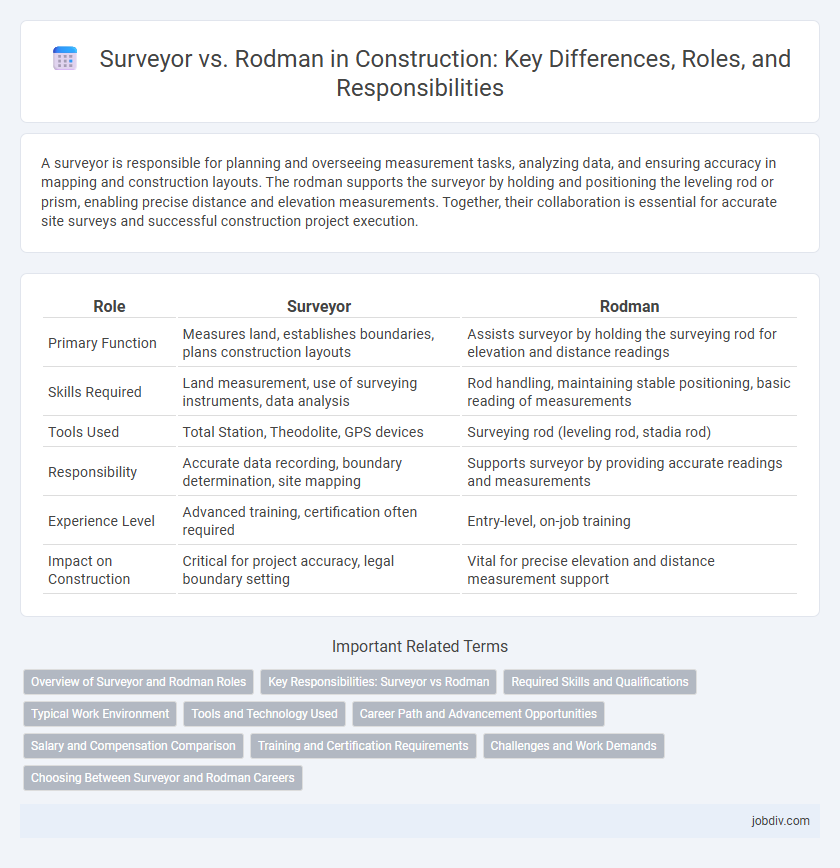A surveyor is responsible for planning and overseeing measurement tasks, analyzing data, and ensuring accuracy in mapping and construction layouts. The rodman supports the surveyor by holding and positioning the leveling rod or prism, enabling precise distance and elevation measurements. Together, their collaboration is essential for accurate site surveys and successful construction project execution.
Table of Comparison
| Role | Surveyor | Rodman |
|---|---|---|
| Primary Function | Measures land, establishes boundaries, plans construction layouts | Assists surveyor by holding the surveying rod for elevation and distance readings |
| Skills Required | Land measurement, use of surveying instruments, data analysis | Rod handling, maintaining stable positioning, basic reading of measurements |
| Tools Used | Total Station, Theodolite, GPS devices | Surveying rod (leveling rod, stadia rod) |
| Responsibility | Accurate data recording, boundary determination, site mapping | Supports surveyor by providing accurate readings and measurements |
| Experience Level | Advanced training, certification often required | Entry-level, on-job training |
| Impact on Construction | Critical for project accuracy, legal boundary setting | Vital for precise elevation and distance measurement support |
Overview of Surveyor and Rodman Roles
Surveyors are responsible for measuring land, determining property boundaries, and preparing detailed maps or plans using specialized instruments like theodolites and GPS equipment. Rodmen support surveyors by holding and positioning leveling rods or prisms, ensuring accurate readings during the measurement process. Both roles are crucial for precise land assessment in construction projects.
Key Responsibilities: Surveyor vs Rodman
Surveyors are responsible for measuring land, creating maps, and determining property boundaries using advanced GPS equipment and total stations. Rodmen assist surveyors by holding and positioning the surveying rod or staff at designated points, ensuring accurate data collection during site measurements. While surveyors analyze and interpret survey data, rodmen mainly support field operations and maintain clear communication of spatial reference points.
Required Skills and Qualifications
Surveyors require strong expertise in mathematics, geography, and engineering principles, along with proficiency in using advanced surveying equipment and software such as GPS and total stations. Rodmen need physical stamina, keen attention to detail, and the ability to assist surveyors by accurately holding measuring rods and recording data in various environmental conditions. Both roles demand knowledge of construction site safety protocols and effective communication skills to coordinate measurements and ensure project accuracy.
Typical Work Environment
Surveyors typically work outdoors on construction sites, utilizing instruments like total stations and GPS equipment to measure land and establish property boundaries, often in varied weather conditions. Rodmen assist surveyors by holding the leveling rods and targets, frequently navigating rough terrain and unstable surfaces to ensure precise measurements. Both roles require physical endurance and adaptability to dynamic environments, including urban developments, highways, and remote construction zones.
Tools and Technology Used
Surveyors primarily utilize advanced tools such as total stations, GPS receivers, and laser scanners for precise measurements and mapping of construction sites. Rodmen rely on traditional equipment like leveling rods, plumb bobs, and hand-held GPS units to assist surveyors in marking and measuring specific points on terrain. The integration of digital data collectors enhances both roles, improving accuracy and efficiency in construction surveying tasks.
Career Path and Advancement Opportunities
Surveyors typically follow a career path that progresses from field technician roles to licensed surveying professionals, with opportunities to specialize in areas like geospatial information systems or construction layout. Rodmen often start as assistants to surveyors, gaining hands-on experience with equipment and field measurements, which can lead to advancement as a chainman or instrument operator. While surveyors have broader prospects for certification and leadership roles, rodmen can advance by acquiring surveying skills and transitioning into survey technician or surveyor positions.
Salary and Compensation Comparison
Surveyors in construction typically earn higher salaries, with average annual wages ranging from $55,000 to $75,000, compared to rodmen who generally make between $35,000 and $50,000. Salary differences reflect the surveyor's greater responsibility in taking precise measurements, operating advanced equipment, and interpreting data for project planning. Compensation packages for surveyors often include benefits such as overtime pay and bonuses tied to project completion, while rodmen usually receive standard hourly wages without performance incentives.
Training and Certification Requirements
Surveyors typically require a professional license obtained through rigorous education, including a degree in surveying or geomatics, followed by passing a licensing exam and completing field experience. Rodmen usually need less formal education, often requiring a high school diploma or equivalent along with on-the-job training under the supervision of a licensed surveyor. Certification for rodmen may include specialized training programs, but it is not as standardized or mandatory as the licensure process for professional surveyors.
Challenges and Work Demands
Surveyors face challenges such as ensuring precise measurements and interpreting complex site data under variable environmental conditions, demanding high technical expertise and attention to detail. Rodmen encounter physical work demands including carrying and positioning heavy surveying rods in uneven terrain, requiring stamina and coordination. Both roles necessitate effective teamwork and communication to achieve accurate and efficient field data collection essential for construction project success.
Choosing Between Surveyor and Rodman Careers
Choosing between a career as a surveyor or rodman depends on your interest in precision measurement versus field support roles in construction projects. Surveyors utilize advanced technology like GPS and total stations to map land boundaries and ensure accurate site layouts, while rodmen assist surveyors by holding rods and prisms for measurements, providing essential on-site data collection. Career growth in surveying often offers higher responsibility and technical expertise, whereas the rodman role serves as an entry point for gaining practical experience in the construction surveying field.
Surveyor vs Rodman Infographic

 jobdiv.com
jobdiv.com